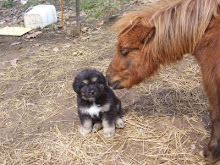I was lucky enough to get to hear the wonderful author and food advocate Marion Nestle speak a couple of nights ago. If you are not familiar with her, you should take the time to become so. She is the nutrition chair at New York University, author of numerous books and host to the w ebsite Food Politics. Of her books, Food Politics is my favorite. It traces the complicated issue of how the food industry influences what food choices we have at the grocery store to eat. These issues are dictated by thirst for profit, not good nutritional policy. She also provides information to help consumers make good food choices for themselves and their families. Her newest book, Pet Food Politics: The Chihuahua in the Coal Mine, is an investigative report on the March 2007 pet food recall.
ebsite Food Politics. Of her books, Food Politics is my favorite. It traces the complicated issue of how the food industry influences what food choices we have at the grocery store to eat. These issues are dictated by thirst for profit, not good nutritional policy. She also provides information to help consumers make good food choices for themselves and their families. Her newest book, Pet Food Politics: The Chihuahua in the Coal Mine, is an investigative report on the March 2007 pet food recall.
 ebsite Food Politics. Of her books, Food Politics is my favorite. It traces the complicated issue of how the food industry influences what food choices we have at the grocery store to eat. These issues are dictated by thirst for profit, not good nutritional policy. She also provides information to help consumers make good food choices for themselves and their families. Her newest book, Pet Food Politics: The Chihuahua in the Coal Mine, is an investigative report on the March 2007 pet food recall.
ebsite Food Politics. Of her books, Food Politics is my favorite. It traces the complicated issue of how the food industry influences what food choices we have at the grocery store to eat. These issues are dictated by thirst for profit, not good nutritional policy. She also provides information to help consumers make good food choices for themselves and their families. Her newest book, Pet Food Politics: The Chihuahua in the Coal Mine, is an investigative report on the March 2007 pet food recall.In her talk, she spent some time talking about her new book Pet Food Politics. Even if you don't have an animal which you buy pet food for, this issue should be important to you. During her investigation, Nestle was able to trace how pet food contaminates ended up back in the human food system. Pet food has vital wheat gluten added to it to increase the protein. The vital wheat in the contaminated pet food was adulterated with melamine, which is an industry byproduct that is cheap and mimics protein. This adulterate was coming from China. Melamine was causing bladder and kidney problems in these animals. At least as important is how melamine was getting into the human food supply. It is common practice for scrap pet food to be sold as livestock feed. On this occasion, the melamine ended up being fed to chickens, cows and fish., which ended up being eaten by humans.








Thanks for coming by my place! I'm glad to know about your blog!
ReplyDelete